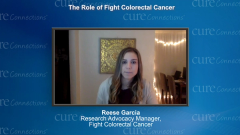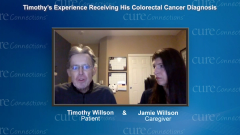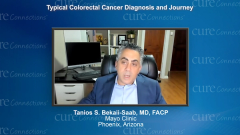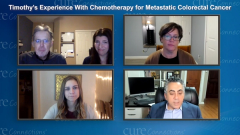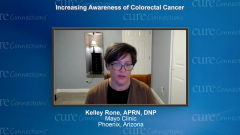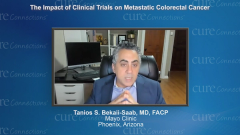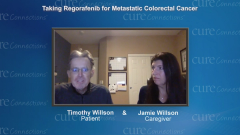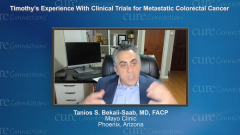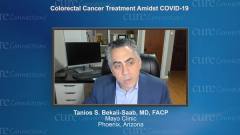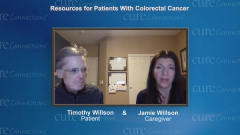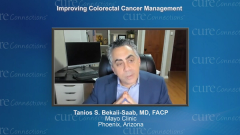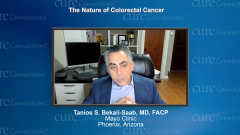
Resources for Patients with Colorectal Cancer
Episodes in this series

Tanios S. Bekaii-Saab, MD, FACP: Tim and Jamie, I am going to go to the two of you, and feel free to take it together. Outside the clinic and besides the two of you, who has played a role in supporting you through this journey? Have you been able to be somewhat more open about communicating about this with friends, family, and loved ones? It is always difficult to talk about an illness at any age but especially when you are younger. Have you felt that some questions or actions were a bit uncomfortable? Share your experience about all this.
Timothy Willson: I will go first. When this started, I was still working full time. I was a national manager, so I was traveling all over the country, and I kept it pretty tight. I had my immediate supervisor in on what was happening because I felt that, once you let that cat out of the bag, everyone is going to treat you differently. All of a sudden, you would go from reaching out and being a good manager to people, to “He has this this huge burden on his back, so let’s not do that.” For the beginning part, I was pretty close: just family, immediate people at work and maybe one or two friends on that.
As things then progressed and time has gone on, people are starting to wonder why they have not heard from me too much, so I extended who I was sharing the information with. In the beginning, I was more comfortable with not making it a big deal and broadcasting, “I have this issue, so bear with me.” I did not do any of that. As time has gone on, I have been able to have good conversations with people I have not talked to in a while. That could help me a lot. I have a different perspective on it going into a lot of years doing this.
Tanios S. Bekaii-Saab, MD, FACP: Jamie?
Jamie Willson: Tim has evolved a lot in his willingness to be open. Initially, understandably, he was used to being tough. His nickname was Nails; he was used to be being tough and not wanting to show weakness, so I understood that. He did not want anybody to know, which sometimes made things difficult at the same time. For me, I was fortunate in the sense that I always worked for oncology companies from the time this happened, so I have had a lot of support at work. People have been understanding. With that said, this year I started with a new company, so that is something I put on myself. I have a fear of wanting to prove myself before they know that I need some support. There is always that battle going on in the background.
In terms of Tim, he has definitely evolved. He has gone from not wanting anybody to know to being willing to talk to people about what is going on. He realizes that talking and reaching out for help is a good thing, and not with everybody but with the certain people you feel comfortable with. Everybody is different. Tim is a private person, so his journey with even expressing things to different people is different from somebody else’s. That is the important thing: understanding that each patient is different and that this is a part of their life, but it is different for each patient. Some want to talk about it, some do not and some evolve over time and may not have wanted to initially but later find value in that.
Tanios S. Bekaii-Saab, MD, FACP: I totally understand. Reese, I am sure that you are in the midst of that. You know a lot about these challenges—your organization does—and how not just patients but their caregivers also face sharing the treatment journey with their loved ones. What kind of resources do you have to help patients, especially the caregivers, in navigating this treatment journey?
Reese Garcia: We definitely recognize that caregivers are facing unique challenges in the time of COVID-19 [coronavirus disease 2019]. I would point out that, when we surveyed our community, we also pulled in caregivers, and we found that they were more likely to report having feelings of anxiety and nervousness when facing these things on behalf of their loved ones. Out of COVID-19, we have developed several caregiver resources looking at caregiver burnout. Of course, there are issues of finances, mental health and job stability as I mentioned. There is a whole gamut of challenges that we have heard from the patient and caregiver community that caregivers are facing, so we have channeled some of our energy toward creating resources with webinars, blogs, and 1one-pagers. Those have been helpful in identifying the true challenges that the community is facing and providing some support there. We have also worked with the Caregiver Action Network, which is focused on providing resources for caregivers, to disseminate that information.
Tanios S. Bekaii-Saab, MD, FACP: That is quite a lot. This is such a complex issue, for not just the patient but also the family and loved ones. The availability of these resources at a time where you feel lost and confused as you go through these roller coasters is certainly a comfort.
Transcript Edited for Clarity

